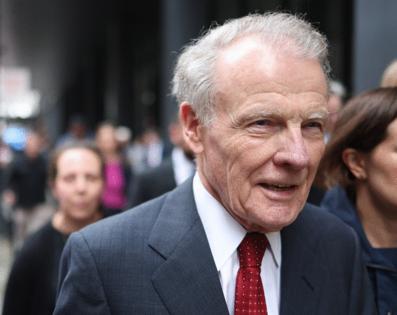Imprisoned ex-Illinois House Speaker Michael Madigan formally disbarred after nearly 60 years as a lawyer
Published in News & Features
CHICAGO — Nearly 60 years after earning his law degree, imprisoned former House Speaker Michael Madigan was formally disbarred this week in a one-paragraph notice buried in a monthly list of attorney discipline from around the state.
Madigan, the notice from the Illinois Supreme Court stated, was disbarred by his own consent following his conviction in February on federal corruption charges, including “conspiring with others to defraud the people of Illinois of their intangible right to his honest services through bribery and false and fraudulent pretenses.”
Attorneys who are disbarred by consent typically have agreed to strike their names from the roll of attorneys in the face of pending disciplinary charges before the Illinois Attorney Registration and Disciplinary Commission.
Although certainly expected, it marked a quiet end to a legal career that began on Nov. 7, 1967, and not only contributed to Madigan’s rise to power, but also his ultimate downfall.
Madigan, 83, was sentenced in June to 7 1/2 years in prison. He reported Oct. 13 to a medium-security camp in Morgantown, West Virginia, where his exact release date has yet to be calculated, according to the U.S. Bureau of Prisons.
After a trial that stretched nearly four months, Madigan was convicted by a jury Feb. 12 on bribery conspiracy and other corruption charges. The jury found him guilty on 10 of 23 counts, including a multipronged scheme to accept and solicit payments from ComEd to Madigan associates for do-nothing subcontracts.
Madigan also was convicted on six out of seven counts — including wire fraud and Travel Act violations — regarding a plan to get then-Chicago Ald. Daniel Solis, who testified at length in the trial, appointed to a state board in exchange for Solis bringing Madigan business for his private law firm.
The jury acquitted Madigan of several other schemes alleged in the indictment and deadlocked on other counts, including the overarching racketeering charge.
After graduating from the University of Notre Dame in 1965, Madigan attended Loyola University School of Law, where he first began making political connections that would shape his young career.
While still in school, Madigan worked as a law clerk in the city of Chicago Law Department, a spot right next to the office of then-Mayor Richard J. Daley, the powerful Democratic Party boss.
“We developed an acquaintance relationship,” Madigan testified, adding: “He knew my father,” who was a longtime 13th Ward operative.
After earning his law degree in 1967, Madigan’s career started in the Law Department before leading to another job as a hearing officer at the Illinois Commerce Commission, which oversees utilities, according to his testimony. Two years later, Madigan won his first election as 22nd District representative in the Illinois House.
It wasn’t until 1982, a year before his rise to the speakership, that Madigan formed a law firm with his friend from Loyola, Vincent “Bud” Getzendanner, that focused on appealing property taxes for large commercial buildings in the Chicago area.
Madigan and Getzendanner testified that the firm had tight protocols in place to make sure that clients who had any business before the legislature, especially the state House, were flagged.
But Getzendanner also testified Madigan was the “big driver” of getting business for the firm, a comment that prosecutors seized upon when it was their turn to question him.
“Fair to say Mr. Madigan was the rainmaker for the firm?” Assistant U.S. Attorney Sarah Streicker asked. Getzendanner said it was.
He brought more business in than any other attorney at the firm? Streicker asked.
“Any other single attorney, yes.”
Jurors in the trial watched a series of undercover FBI videos from Madigan’s firm as he sought business from rich developers, including one from August 2014 about a planned Chinatown hotel project.
“We’re not looking for a quick killing here,” Madigan said near the end of the meeting. “We’re interested in a long term relationship.”
Two years later, Solis was wearing a hidden video camera for the FBI when Madigan pulled him into his office before a meeting with a different developer and chastised him for bringing up the term “quid pro quo” in an earlier call.
“Over the phone, you made a comment that there was a quid pro quo,” Madigan said on the recording played for the jurors. “You shouldn’t be talking like that. You’re just recommending our law firm because if they don’t get a good result on their real estate taxes, the whole project will be in trouble.”
“Absolutely, absolutely,” Solis said, “Yeah.”
_____
©2025 Chicago Tribune. Visit chicagotribune.com. Distributed by Tribune Content Agency, LLC.







Comments